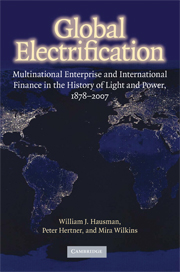 Global Electrification
Global Electrification Book contents
- Frontmatter
- Contents
- Tables and Illustrations
- Series Editors' Preface
- Preface
- Acknowledgments
- Authors and Contributors
- PART I CONCEPTS
- 1 The Invention and Spread of Electric Utilities, with a Measure of the Extent of Foreign Ownership
- 2 Multinational Enterprise and International Finance
- PART II CHANGES
- PART III CONCLUSIONS
- Appendix A: Abbreviations, Acronyms, Company Names, and Variations on Company Names
- Appendix B: Notes to Table 1.4 Foreign Ownership of Electric Utilities, Four Periods
- Notes
- Select Bibliography
- Index
1 - The Invention and Spread of Electric Utilities, with a Measure of the Extent of Foreign Ownership
Published online by Cambridge University Press: 26 July 2009
- Frontmatter
- Contents
- Tables and Illustrations
- Series Editors' Preface
- Preface
- Acknowledgments
- Authors and Contributors
- PART I CONCEPTS
- 1 The Invention and Spread of Electric Utilities, with a Measure of the Extent of Foreign Ownership
- 2 Multinational Enterprise and International Finance
- PART II CHANGES
- PART III CONCLUSIONS
- Appendix A: Abbreviations, Acronyms, Company Names, and Variations on Company Names
- Appendix B: Notes to Table 1.4 Foreign Ownership of Electric Utilities, Four Periods
- Notes
- Select Bibliography
- Index
Summary
Electricity is essential, but it was not always so. The vast benefits, as well as dependency, electricity has brought to the contemporary world are never more dramatically demonstrated than when a blackout occurs. In economically developed countries, even brief blackouts cause severe inconvenience, and extended blackouts can impose huge economic costs and even lead to breakdowns in civil order. In less developed countries, blackouts tend to be chronic, inhibiting economic growth and social progress. Two massive blackouts, each affecting over 50 million people, occurred in August and September of 2003, one engulfing the midwestern and northeastern United States and part of eastern Canada, the other affecting most of Italy – the largest blackout in Europe since World War II. These blackouts demonstrated both the importance of electricity and the imperfection of the industry that delivers it. As the final report of the task force investigating the U.S.-Canada failure noted, “Modern society has come to depend on reliable electricity as an essential resource for national security; health and welfare; communications; finance; transportation; food and water supply; heating, cooling, and lighting; computers and electronics; commercial enterprise; and even entertainment and leisure – in short, nearly all aspects of modern life.” Nitin Desai, Secretary General of the United Nations' World Summit on Sustainable Development (Johannesburg, 2002) emphasized the importance of electricity both for today and for the future: “Electricity has profoundly transformed the industrialized world and led from the era of smoke chimneys into the era of knowledge-based services shaping the 21st century … .
- Type
- Chapter
- Information
- Global ElectrificationMultinational Enterprise and International Finance in the History of Light and Power, 1878–2007, pp. 3 - 34Publisher: Cambridge University PressPrint publication year: 2008
